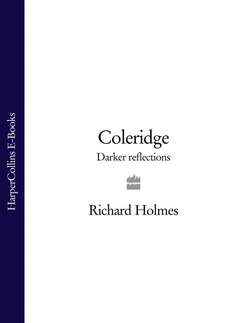Читать книгу Coleridge: Darker Reflections - Richard Holmes - Страница 44
FOUR THE FRIEND IN NEED 1
ОглавлениеWhen Coleridge left Bury St Edmund’s in August 1808, he performed one of his characteristic disappearing acts, and did not arrive at Grasmere for a month. This time it seems that he went on a kind of “retreat”, part religious and part medical, before embarking on the great gamble of his newspaper enterprise. His Notebooks suggest that he went to ground at Leeds, staying with some of Clarkson’s Quaker friends. Here he underwent the worst pains of an opium-withdrawal regime. Clarkson wrote to him secretly at the Golden Sun Inn; and John Broadhead, a Quaker bookseller, furnished him with grocery supplies and more spiritual nourishment.1
Coleridge talked at length with the Friends (the title of his paper may have been inspired partly by their unworldly sympathy) and even visited one of their schools at nearby Ackworth, noting that the “Girls’ Playground” was grassed but the Boys’ worn “perfectly bare”, a sign of their different capacities for play and aggression.2 He discussed the inward spirituality of the great Quaker teachers William Law and George Fox, and envied the Quakers’ simple confidence in prayer, so unlike his own.
“The habit of psychological Analysis makes additionally difficult the act of true Prayer. Yet as being a good Gift of God it may be employed as a guard against Self-delusion, tho’ used creaturely it is too often the means of Self-delusion…O those who speak of Prayer, of deep, inward, sincere Prayer, as sweet and easy, if they have the Right to speak thus, O how enviable in their Lot!”3 The struggle to renew his religious faith went hand in hand with the struggle against opium, each relapse felt like a “Savage Stab” piercing both “Health and Conscience”.4 He experienced as never before a sense of personal sin, of the “Fall” he had mentioned to Wordsworth, but now as an absolute condition of his life. The idea of redemption, both as religious and psychological need, came to possess his thinking “O for the power to cry out for mercy from the inmost: That would be Redemption!”5
Philosophically this placed the concept of Evil, as a fundamental and inescapable fact of nature, back at the centre of all his thought. Poetically, it had been there since the days of “The Ancient Mariner”. But now it had returned as a personal conviction, connecting his religious views with those on art and politics. When he came to write the opening number of The Friend, he startled his readers with the declaration of this as an a priori truth of experience. “I give it merely as an article of my own faith, closely connected with all my hopes of amelioration in man…that there is Evil distinct from Error and from Pain, an Evil in human nature which is not wholly grounded in the limitations of our understandings. And this too I believe to operate equally in the subjects of Taste, as in the higher concerns of Morality.”6 It was a dark reflection, born out of personal sufferings, and articulating the spiritual “witness” that the anonymous Quakers had encouraged during this phase of his regeneration.
